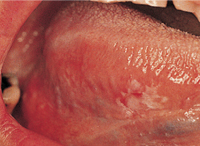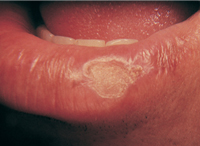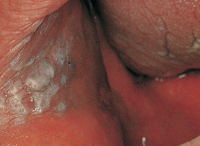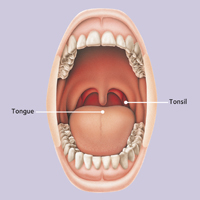Depending on your health and risk factors, your dental team may also recommend an advanced oral cancer screening, which enables clinicians to detect oral cancers not visible based upon a visual exam alone. The exam is quick and painless.
Mouth and Throat Cancer
Cancer is a deadly disease. Each year in the United States, about 40,000 new cases of mouth and throat cancer are diagnosed. Almost half of those patients will die within five years.
Your dentist checks for cancer every time you visit. Cancers that are found early can be easier to treat-so these types of cancer screenings are one more reason to see your dentist regularly.
This page will tell you some ways to lower your risk for mouth and throat cancer. And by watching for the symptoms listed here, you are more likely to find the cancer earlier if you do have it.
What Are the Signs Of Mouth & Throat Cancer?
Below is a list of mouth and throat cancer signs and symptoms. Check your mouth in the mirror each day when you brush and floss. If there are any changes in your mouth or neck, or if you notice any of these signs or symptoms, contact your dentist.
Signs of oral (mouth) cancer:
- a sore or irritation that doesn’t go away
- red or white patches
- pain, tenderness or numbness in mouth or lips
- a lump, thickening, rough spot, crust or small eroded area
- difficulty chewing, swallowing, speaking, or moving your jaw or tongue
- a change in the way your teeth fit together when you close your mouth
 |
 |
 |
| Cancer on the tongue | Cancer on the lip | Leukoplakia (which can turn into cancer) inside the cheek |
|
Signs of throat cancer:
|
 |
Am I at Risk for Cancer?
Anyone can get cancer. However, it occurs most often in people who smoke cigarettes, cigars, or pipes and drink heavily (30 drinks or more per week). That combination is estimated to cause the majority of mouth and throat cancers diagnosed in the United States. Here are some additional risk factors:
- Current research shows that some types of human papillomavirus (HPV) can cause throat cancer, which affects the base of the tongue and tonsils. HPV is very common-many people have
- the virus in their bodies and don’t even know it.
- People who often spend long periods of time in the sun are at higher risk for lip cancer.
- A diet with too few fruits and vegetables may increase the risk for cancer.
How Can I Lower My Risk for Mouth and Throat Cancer?
- As part of your oral hygiene routine, watch for changes in the soft tissues of your mouth.
- Avoid all tobacco products.
- Avoid heavy alcohol use.
- Feel your neck regularly for lumps.
- Visit your dentist for regular oral cancer screenings.
How Can My Dentist Help?
During a dental exam, your dentist will check your face, neck and mouth for lumps, red or white patches, and sore areas that do not heal. Be sure to tell your dentist if you see any changes in your mouth and neck. If signs of cancer are found, it is easier to treat at this stage than later on.
Be aware of any changes in your mouth and throat. If you have any concerns about mouth and throat cancer, talk with your dentist. It may help save your life.
This ADA educational message displayed by permission.

